Results
-
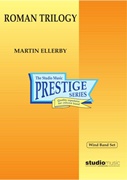 £37.95
£37.95Roman Trilogy (Prestige Concert Band - Score only) - Ellerby, Martin
This work falls into three movements, all concerned with the subject of the Italian capital city of Rome, rather like previous tributes to other European citites in Paris Sketches, Venetian Spells and The Cries of London. The emphasis is on atmosphere and drama, be they respectful or joyful! It is acknowledged that Ottorino Respighi has influenced this work though his own eternal Rome tributes are not challenged here, rather saluted and celebrated.The three movements are: 1. Collosea di Romaan evergrowing march mood, builds in intensity and density as we approach the mighty Colosseum, the amphitehatre of Classical Rome, where deadly spectacles were once played out. We should not forget that countless thousands died here whilst even more laughed in the name of entertainment: their memory is reflected in the coda. In its unique way this icon of Rome is one of the most tragic historical places.2. Capella Sistinathe Sistine Chapel of the Vatican City is observed in a series of chorales and interludes. The visitor can look 360o around and be presented with a series of Biblical representations and commentaries. The music attempts to reflect these contrasting panels whilst ultimately bowing to the glory of this magnificent artistic creation. The coda is enigmatic, inconclusive - a single viewing cannot reveal all the mysteries and beauties within. 3. Fonatani di Trevitime for laughter and fun! The Trevi Fountain is one of Rome's finest and visually overboard locations! This is indicated as a Burletta: 'a la dolce vita' which means 'the sweet life'. This burletta (meaning 'little joke') makes use of tarantella and saltarello rhythms and features a pair of tambourines which are associated with these forms. La Dolce Vita was also a film by the renowned Italian director Federico Fellini featuring a memorable scene in the Trevi with a wet Enita Ekberg: something modern day visitors are discouraged from emulating!Duration: 11:15Recorded on Polyphonic QPRM161D ROMAN TRILOGY (TheRoyal Northern College of Music Wind Orchestra)
Estimated dispatch 7-14 working days
-
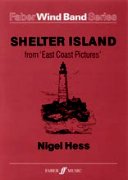 £55.00
£55.00Shelter Island (from East Coast Pictures) (Concert Band - Score and Parts) - Hess, Nigel
Shelter Island' is the first movement of 'East Coast Pictures'. It is a depiction of the Shelter Island itself, a few hours drive east of New York. In the summer it becomes a crowded tourist trap; but in the winter it is gloriously deserted and bravely faces the onslaught of the turbulent Atlantic, shrouded in sea mists and driving rain. This 'picture' is a fond memory of a winter weekend on Shelter Island.East Coast Pictures was commissioned by the British Youth Wind Orchestra with funds from the National Westminster Bank plc. These three short 'pictures' were inspired by several visits to a small part of the American East Coast, an area that provides great extremes in the geography and the people.Duration: 5.00
Estimated dispatch 7-14 working days
-
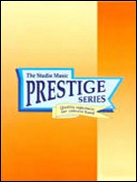 £16.95
£16.95SKYRIDER (Concert March) (Prestige Concert Band Extra Score) - Sparke, Philip
Extra Score. This concert march was commissioned by the BBC for the EBU (European Broadcasting Union) as their entry in the march style new music composition. This outstanding march was the outright winner. Grade 4. Performance time 3'40" (Recorded on QPRM150D CHIVALRY, Royal Northern College of Music Wind Orchestra)
Estimated dispatch 7-14 working days
-
 £82.95
£82.95SKYRIDER (Concert March) (Prestige Concert Band Set) - Sparke, Philip
Score and Parts. This concert march was commissioned by the BBC for the EBU (European Broadcasting Union) as their entry in the march style new music composition. This outstanding march was the outright winner. Grade 4. Performance time 3'40" (Recorded on QPRM150D CHIVALRY, Royal Northern College of Music Wind Orchestra)
Estimated dispatch 7-14 working days
-
 £114.95
£114.95SOURCE (Journey of a Scottish River) (Prestige Concert Band - Score and Parts) - Fraser, Bruce
Sub-titled Journey of a Highland River it is a descriptive work with thematic material derived from the composer's initials BCEFA. It basically attempts to describe the origins of a Highland river in a deep mountain cavern and it's subsequent journey as mountain stream gathering momentum as wends it's way to the rolling waves of the sea. Performance time 7'39' (Recorded on QPRM148D, VIZCAYA, Royal Northern College of Music Wind Orchestra)
Estimated dispatch 7-14 working days
-
 £32.95
£32.95SOURCE (Journey of a Scottish River) (Prestige Concert Band - Score only) - Fraser, Bruce
Sub-titled Journey of a Highland River it is a descriptive work with thematic material derived from the composer's initials BCEFA. It basically attempts to describe the origins of a Highland river in a deep mountain cavern and it's subsequent journey as mountain stream gathering momentum as wends it's way to the rolling waves of the sea. Grade 5. Performance time 7'39' (Recorded on QPRM148D, VIZCAYA, Royal Northern College of Music Wind Orchestra)
Estimated dispatch 7-14 working days
-
 £15.95
£15.95TALES FROM ANDERSEN (Progress Concert Band Extra Score) - Ellerby, Martin
Extra Score. Having immersed himself in a translated volume of the most popular Andersen fairy tales the composer selected five contrasting stories and shapes them into a miniature suite. The movements are:- 1. Overture - The Steadfast Tin Soldier. 2. Soliloquy - The Little Match Girl. 3. Scherzo - The Emperor's New Clothes. 4. Idyll - The Snow Queen. 5. Finale and Chorale - The Red Shoes. Duration: 9:25 (Recorded on QPRM150D CHIVALRY, Royal Northern College of Music Wind Orchestra)
Estimated dispatch 7-14 working days
-
 £77.95
£77.95TALES FROM ANDERSEN (Progress Concert Band) - Ellerby, Martin
Having immersed himself in a translated volume of the most popular Andersen fairy tales the composer selected five contrasting stories and shapes them into a miniature suite. The movements are:- 1. Overture - The Steadfast Tin Soldier. 2. Soliloquy - The Little Match Girl. 3. Scherzo - The Emperor's New Clothes. 4. Idyll - The Snow Queen. 5. Finale and Chorale - The Red Shoes. Duration: 9:25 (Recorded on QPRM150D CHIVALRY, Royal Northern College of Music Wind Orchestra)
Estimated dispatch 7-14 working days
-
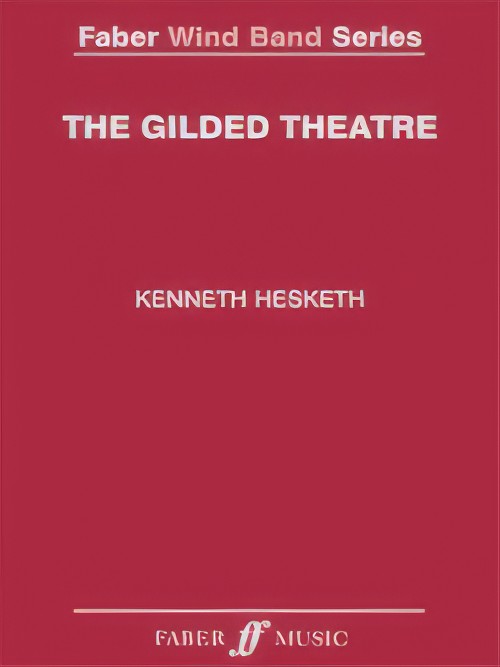 £95.00
£95.00The Gilded Theatre (Concert Band - Score and Parts) - Hesketh, Kenneth
The Gilded Theatre was commissioned by the National Youth Wind Orchestra of Great Britain on the occasion of its fortieth anniversary. They gave the first performance on 10th August 2008, at St. John's Smith Square, London conducted by James Gourlay.The Gilded Theatre can, in some ways, be seen as a continuation of dramatic forms as presented in a previous piece by Hesketh, Diaghilev Dances. Unlike the Dances, however the music in The Gilded Theatre is conceived as one continuous span and stretches of music are also subtitled and refer to stock characters or scenarios redolent of the commedia dell'arte or 17th Century French Theatre. The subtitles are Rideau, Les Idiots Ou Les Amants, Le Combat Commence, Desespoir, L'apparition, Folie, La Mort, Rideau.The music narrative progresses through dramatic, comedic, romantic and aggressive moods supporting the idea of the abstract play to which the the above subtitles refer. Throughout the piece the composer has sought to challenge the players both technically and emotionally, and it is the players themselves who are in fact the protagonists in the piece.
Estimated dispatch 7-14 working days
-
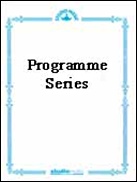 £74.95
£74.95THREE PAINTINGS BY LAUTREC (Recommended!) (Programme Concert Band) - Johnson, Laurie
(Recorded on QPRM150D CHIVALRY, (Royal Northern College of Music Wind Orchestra)
Estimated dispatch 7-14 working days
